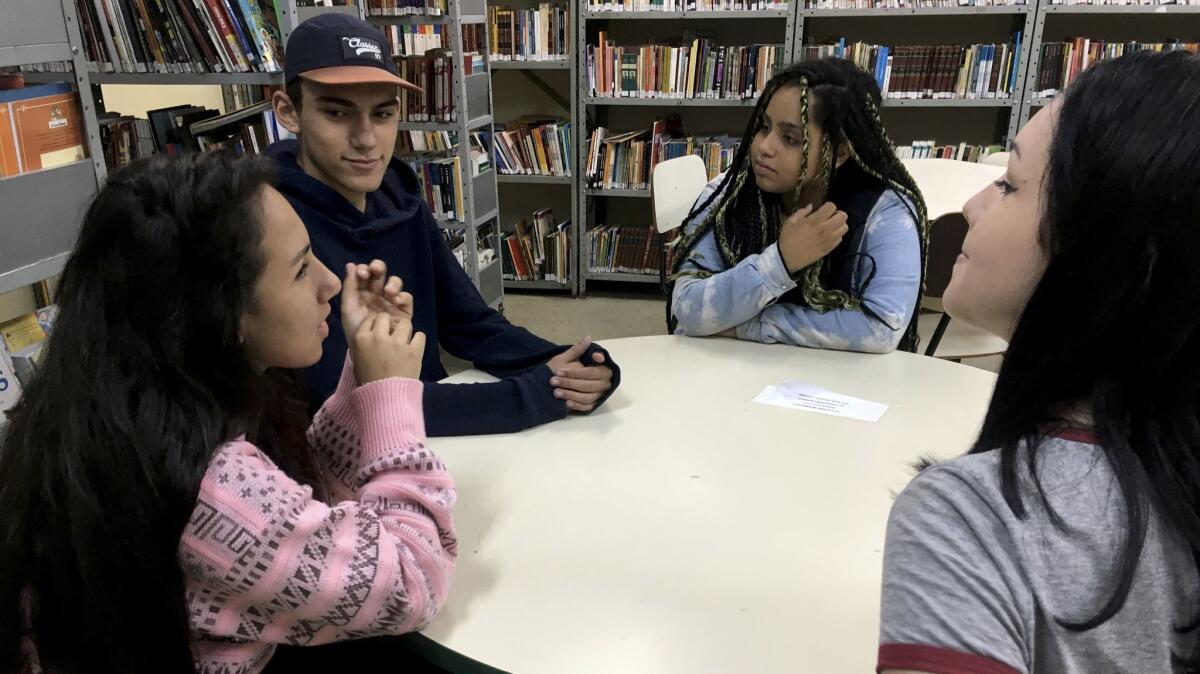Brazilian youths share their take on the volatile political situation in their country

The students sat at a round table, ready to talk about a subject they don’t bother broaching at home anymore, because they know it won’t end well.
“Every time we talk about politics at home, it ends in a huge fight,” said Jessica Nunes de Carvalho, 15, the daughter of a stay-at-home mother and a hardware store owner.
“I’m a bit more — how should I put this? — liberal, I would say. My parents were raised a certain way and are used to things being that way. So if I give my opinion about something that they’re not used to or that they don’t support, they get a bit angry.”
Evelyn Ruama Martins Trindade, a 16-year-old whose parents own a small business that installs window screens, nodded in agreement.
“My opinions on politics and the opinions of my parents are completely different,” she said. “We always end up arguing.”
Politics has long been a sore subject between teenagers and their parents, but in Brazil, where politicians have taken center stage for their nonstop involvement in illegal activity, cross-generational discussions take on a particular fervor. And if teenagers here have strong opinions about politics, it’s not surprising; in their young lives they’ve already seen one president impeached, another convicted of taking bribes and another accused of yet more corruption.
And that’s on top of scores of federal lawmakers also facing corruption charges in the billion-dollar graft scandal known by its law enforcement code name, Lava Jato, or Car Wash.
To hear what teenagers had to say about this, The Times assembled a quartet of students at the Professora Cynira Pires dos Santos public school in Sao Bernardo do Campo, just outside Brazil’s largest city and business capital, Sao Paulo. Admittedly, it’s not a scientific survey, but Jessica, Evelyn and the two who joined them proved to be thoughtful observers of the adults who got Brazil into its current mess — and they had some advice for a country where corruption seems inescapable.
But first a little background. The Lava Jato investigation was launched in March 2014 to look into allegations that Brazil’s biggest construction firms were overcharging the state-run oil giant Petrobras, enabling directors of the oil company to skim money off the top as payment for awarding the contracts.
The highest-profile politician to be convicted in the investigation so far, former President Luiz Inacio Lula da Silva, is also well known for being from Sao Bernardo do Campo, the same working-class city where the teenagers live and go to school. Corruption, the students said sadly, just seems a part of Brazilian life.
“We live in a very individualistic society,” Evelyn said. “Nobody thinks of anybody but themselves. People just want to have, and that makes them always want to get ahead of somebody else. That’s one of the motivations for corruption. And it’s not something new. It’s something that started years and years ago.”
“It’s what we call the jeitinho brasileiro,” said Joao Pedro Moreira de Souza, 15, referring to the small, creative things Brazilians do to get ahead or solve a problem. “A simple example: The man at the corner store gives you 2 reais extra in change. Are you going to give it back to him or not?” Often, the answer is not.
Although several political parties have been implicated in the widespread corruption scheme, there has been a lot of finger-pointing at Lula’s Workers’ Party, which held the presidency from the beginning of his first term in 2003 to the impeachment of his successor, Dilma Rousseff, in August 2016.
Defenders and critics of Lula and Rousseff — and current President Michel Temer — have repeatedly taken to the streets, sometimes squaring off in large and ugly demonstrations. The students bemoaned what they described as Brazilians’ obsession with political party affiliations.
“When people talk about politics nowadays, they talk a lot about parties, but politics isn’t just about parties,” Evelyn said.
“People still judge others based on the division of left and right,” Jessica said. “If you say you’re more left-wing or right-wing, that prejudice is already there.”
“That’s why I said that everything nowadays is linked to a political party,” Evelyn said. “If you say you’re more left- or right-leaning, people already assume you support a certain party, and that’s not necessarily the case.”
Jessica, Evelyn, Joao Pedro and another student — Monalisa Dantas, 16 — were careful to avoid mentioning specific parties by name. They also said they shy away from talking politics with friends or online because it often ends in a screaming match. And no matter which side you’re on — or even if you’re not on any — you end up getting attacked. Such is politics these days in Brazil.
The students do, however, have strong opinions and want to make sure their voices are heard — at least through the privacy of the voting booth.
Voting in Brazil is mandatory at age 18 — those who don’t cast a ballot pay a small fine. Teenagers can choose to register to vote at 16. The four agreed that even if they don’t find any of the candidates suitable next year, which is likely, they’ll still go to the polls and cast a blank vote.
Regardless of who is elected Brazil’s next president, they do hope their country can learn from its mistakes and make improvements. One of their biggest concerns is education, which they agree is the basis for progress in any society.
“People who are rich have more opportunities in every area, but especially education,” said Monalisa, whose father is a cook and mother is a receptionist. “Poor people have public school. And I don’t think public school is enough to help us grow in life.”
“And the reforms they’re planning are not going to help,” said Joao Pedro, whose parents own a clothing store.
The federal government in September last year announced a curriculum overhaul that requires students to choose an area of study to focus on during their three years of high school: humanities and social sciences, natural sciences, languages, math, and vocational training.
The changes, which passed in the Senate in February, also mean that schools are no longer required to offer arts, physical education, sociology and philosophy classes. The decision caused an uproar among students and educators, leading to debates and protests.
The students recalled a TV commercial from the government that promoted the overhaul, showing students smiling broadly at the idea of learning a trade and stopping their studies after high school. This drew laughter from all four students. They also detected a disturbing motivation for the changes — one that, again, comes down to politics.
“They don’t want citizens who criticize,” Evelyn said.
“They want us to provide a service, and that’s it,” Monalisa said. “They want to take away sociology and philosophy classes so that we don’t think, so that we don’t learn how to change our way of thinking by hearing other perspectives. They want to keep us alienated. Because we live in a system where we are very alienated.”
But the four agree that it’s not only up to politicians to make the changes needed to improve the future of their country.
“We blame politicians a lot, but we don’t look at ourselves,” Joao Pedro said.
Jessica nodded. “We expect a lot from others, but we have to do our part too. If we see something happening that is wrong, we have to make sure that it stops and doesn’t happen again.”
“Because corruption isn’t only there, in Brasilia or in parliament,” said Monalisa, referring to Brazil’s capital. “Corruption is everywhere.”
Langlois is a special correspondent.
ALSO
Thousands protest ruling to overturn ban on ‘conversion therapy’ for gays and lesbians in Brazil
The bodies keep piling up inBrazil’s Rio Grande do Norte, one of the most deadly places in the world
https://www.latimes.com/world/mexico-americas/la-fg-brazil-presidents-charged-20170906-story.htmlBrazil’s top prosecutor files criminal charges against two ex-presidents
More to Read
Start your day right
Sign up for Essential California for news, features and recommendations from the L.A. Times and beyond in your inbox six days a week.
You may occasionally receive promotional content from the Los Angeles Times.






